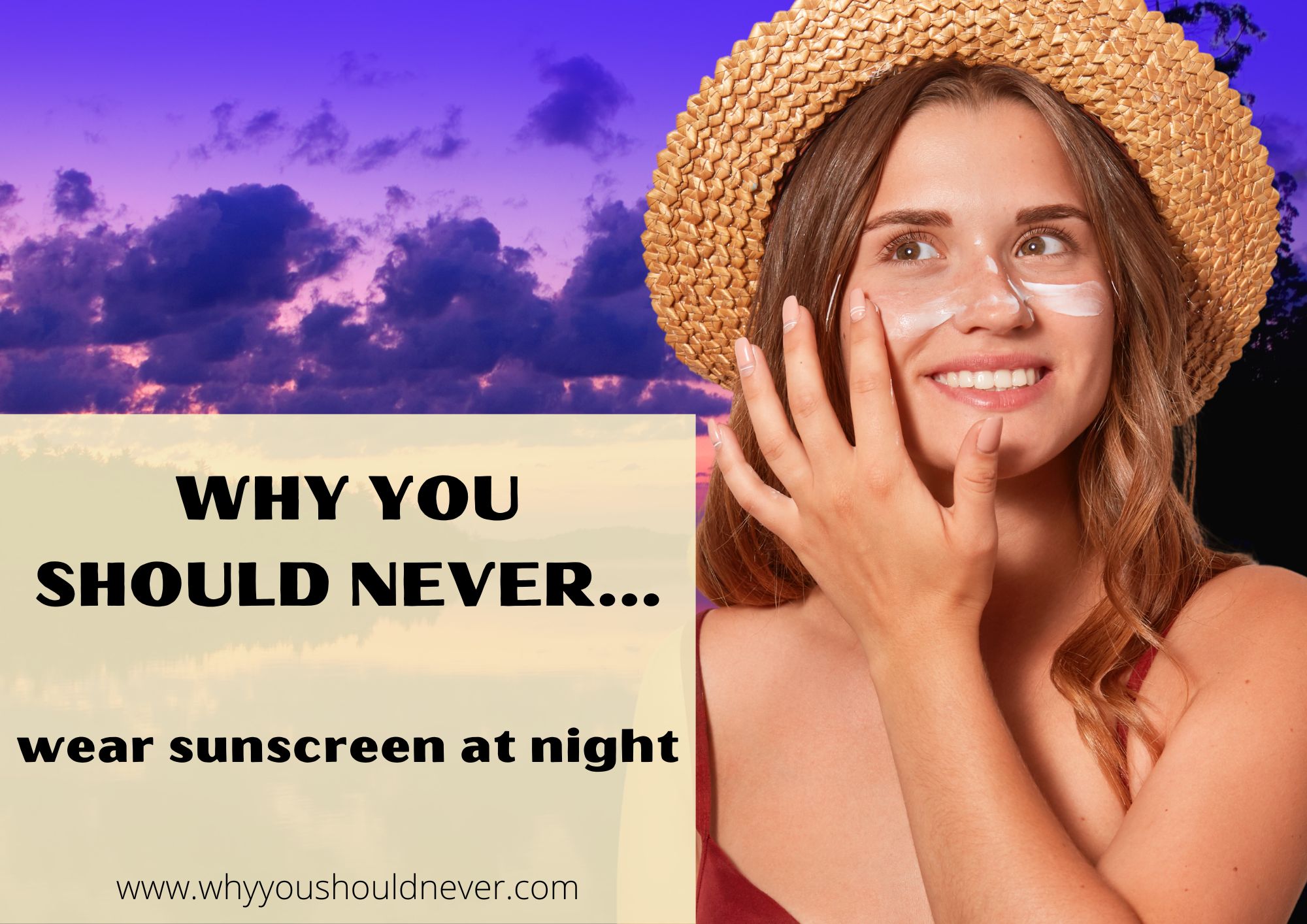![]()
Why You Should Never Wear Sunscreen At Night
We all understand the drill when it comes to the day time routine: grab your favorite shades, don your floppy hat, and lather on the sunscreen.
Sunscreen, our trusty guardian, shields our skin from harmful UV rays, preventing sunburn, premature aging, and reducing the risk of skin cancer. It’s been our ally in the war against harmful solar radiation for ages, and we love it.
But when the sun goes down, what happens to this ritual? If you’re the type to slather on SPF before hitting the sheets, let’s put a pause on that, okay? Because, believe it or not, wearing sunscreen at night might not be the best idea.
7 reasons why you shouldn’t wear sunscreen at night
1. Sunscreen protects against sunlight, and there’s no sunlight at night
This really is the crux of the matter. Sunscreen is designed to shield your skin from the harmful UV rays emitted by the sun. At night, when the sun is no longer up, this protection isn’t necessary.
We tend to overlook this simple fact because we’re so conditioned to think of sunscreen as an integral part of our skincare routine. But truth be told, when there’s no sunlight to guard against, your sunscreen can clock out early.
2. Your skin needs to breathe
It’s not just a cliché statement, your skin indeed needs to breathe. Imagine spending the entire day under a protective layer of sunscreen. It’s done a great job, true, but come night time, your skin craves a breather.
Night is when your skin switches to recovery mode, healing from the damages suffered during the day and regenerating itself. Sunscreen can clog your pores, disrupting this essential process, which could lead to acne and other skin issues.
3. Unnecessary exposure to chemicals
Most sunscreens contain chemicals like oxybenzone, avobenzone, and octinoxate, which absorb UV radiation and protect your skin. These chemicals are safe for occasional daytime use but applying them consistently, especially when not required, might lead to unnecessary exposure.
Studies have suggested a potential link between prolonged exposure to certain sunscreen ingredients and health concerns like hormonal disruptions.
4. Saves you some cash
Let’s talk practicality. High-quality sunscreens with a broad spectrum of protection can be a bit pricey. Using them unnecessarily at night is like flushing money down the drain. Reserve your sunscreen for when it’s most effective – during the day, when UV exposure is a real threat.
5. Lack of Vitamin D
While this point might not seem directly related, it’s crucial. Sunscreen, although incredibly beneficial, does decrease our skin’s ability to generate vitamin D from sunlight.
We typically compensate for this during the day with our diet and supplements. But continuous application, even at night, can feed into the misconception that we’re ‘always protected’, potentially leading to complacency about maintaining a balanced vitamin D intake.
6. Increased risk of skin irritation
Some folks have sensitive skin that reacts to certain sunscreen ingredients, leading to irritation, redness, and itchiness. The chances of these reactions increase with prolonged use, especially if you’re layering on sunscreen day and night.
7. Lessening environmental impact
This might not have been the first reason to pop in your mind, but it’s a important one. Sunscreen ingredients, particularly oxybenzone and octinoxate, have been found to be harmful to aquatic ecosystems, especially coral reefs.
These chemicals can wash off your skin during the day when you swim or even when you shower, making their way to our water systems.
Although this environmental impact won’t be completely eliminated if you stop wearing sunscreen at night, it would certainly be reduced. Every bit helps in environmental conservation, and by reserving sunscreen for when it’s most needed, you’re doing your part for Mother Earth.
Wrapping things up
There’s a time and place for everything, and that includes your beloved SPF. During the day, when the sun is in all its glory, your sunscreen steps up, forming an essential line of defense against damaging UV radiation. But as night falls and the stars begin to twinkle, it’s time to give your skin a break, let it breathe, and allow natural restorative processes to occur.
Shunning the nocturnal sunscreen application isn’t just about healthier skin. It’s also about making more responsible choices – both financial and environmental.
Remember, your skincare products aren’t just about you; they have wider implications. Use wisely, and treat your skin – and the world around you – with the care it deserves.
(You might also be interested in checking out our article Why You Should Never Wear Sunscreen.)
